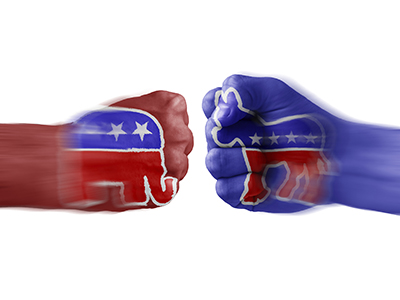Finally, the votes are being counted.

Election Day closes a process that has seen voters across the country casting early or mail-in ballots for weeks now. Without a crystal ball, employers can’t know what they will face in the next 4 years, but a look at both candidates, President Donald Trump and former Vice President Joe Biden, makes some policy predictions possible.
But administration policy isn’t the only factor. More than in most elections, employers also are facing growing conflict among coworkers who bring their politics to work—conflict that may linger well after the votes are counted.
Employers Worried About Division
Charles S. Plumb, an attorney with McAfee & Taft in Tulsa, Oklahoma, says he’s hearing from employers that are preparing for continued strife between employees. While it’s common to face disagreements among employees in the runup to an election, what he’s seeing this year is “unique in my experience.”
Plumb says he’s hearing from employers concerned about long-term and serious divisions in the workplace. Those employers are asking for advice on how to handle escalating tension that will only get worse if the outcome of the election drags on. He advises employers to be alert and proactive.
“If you’re getting things escalating, tamp it out now. Don’t let it get to the shouting or pushing or shoving or punching stage,” Plumb says.
Private employers have the right to ban political speech in the workplace, Plumb says, meaning employers can let employees know they can’t engage in bullying, offensive comments, and other confrontations. He said he’s heard of employees being sent home.
Issues to Watch
The outcome of the election will be determinative on a number of employment-related issues—employer practices related to COVID-19, health care, enforcement policies of the U.S. Department of Labor (DOL), and more, according to Burton J. Fishman, an attorney with Fortney & Scott, LLC in Washington, D.C.
COVID-19: “Like most Americans, employers want to know when the pandemic will be sufficiently under control to permit a return to something approaching normal,” Fishman says. A Biden administration would likely bring a change in Occupational Safety and Health Administration (OSHA) policy and practice, he says, but with the resurgence of the virus, “no one knows what steps will be effective.”
Health care: “This may be ‘the issue’ in the campaign,” Fishman says. He points out Trump has attacked the Affordable Care Act (ACA) and promised a replacement plan that hasn’t materialized.
“A Republican Senate will show animus against the ACA and has shown no interest in drafting a replacement or expansion. This leaves employers and employees where they are now,” Fishman says, adding a Biden administration would attempt to expand the ACA, but Congress must agree.
Patrick W. McGovern and Gina M. Schneider, attorneys at Genova Burns LLC in Newark, New Jersey, weighed in on the election’s effect on the ACA. “If Trump is reelected, the Trump administration’s stand on ACA depends on how the Supreme Court resolves the challenge to ACA now pending in Texas v. California, and whether the Democrats hold onto the House and the Republicans hold onto the Senate,” they say.
If the Court strikes down the ACA as a whole, “there is nothing in the pipeline to take its place,” McGovern and Schneider say, adding that Trump “has provided no insight into the provisions of his proposed substitute plan other than to state that it will protect preexisting conditions. Also, there is no certainty that a Republican Senate will support his proposed plan.”
McGovern and Schneider say a Biden administration “can be expected to propose expanding and fine-tuning the ACA,” including enhancing premium subsidies, expanding eligibility for Medicare, and allowing consumers to choose between an employer plan and a public option.
Immigration: “A Trump win means a continuing closure of the U.S. to foreigners, especially in H-1B visas, vital to the tech industries,” Fishman says. “A Biden win would start with reanimating DACA (the Deferred Action for Childhood Arrivals program) and returning many U.S. immigration policies to 2016 status.” But the presence of so many unemployed Americans “will profoundly affect immigration policy and practice for the next few years,” he says.
McGovern says another Trump administration would mean a continuation of policy aimed at making it more difficult to obtain popular nonimmigrant business visas. Also, the pandemic-related travel restrictions aren’t expected to ease this year or in early 2021. “The real question is whether the president will roll back the visa restrictions even when the risk of coronavirus is abated, since he is accomplishing some of his policy objectives on the back of the virus,” he says.
A Biden administration would not be likely to prioritize undoing any of the immigration restrictions, McGovern says, at least in the first year. “Also, politically, making more visas available or more easily accessible to non-U.S. workers may be a hard sell to Biden supporters, since the argument will be that the jobs in question should go to U.S. workers who lost their jobs during the pandemic.”
Agency action: A change in administration would bring a change in personnel and direction to the DOL and agencies such as the Equal Employment Opportunity Commission (EEOC) and the National Labor Relations Board (NLRB).
Fishman says the EEOC “has tried to retain a measure of its independence,” but that independence may not last if Trump wins because he has announced his wish to make the EEOC more in step with the legal positions of the Justice Department.
As for the NLRB, Fishman says a Trump win would mean a continuation of an overtly proemployer/antiunion Board and general counsel. A Biden win would bring efforts to alter Board regulations on independent contractors, but that wouldn’t be quickly achieved, he says, because of the NLRB’s decision to issue regulations.
“Coordinating NLRB regulations which are at variance with those of a Biden administration will present a challenge,” Fishman says.
Tammy Binford writes and edits news alerts and newsletter articles on labor and employment law topics for BLR web and print publications.
